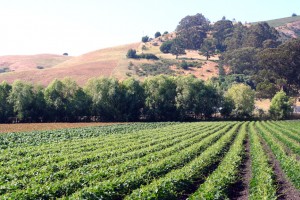
Four South Coast farms – Ano Nuevo Flower Growers, Muzzi Ranch, Marchi’s Central Farm and Cascade Ranch – will have to monitor their fertilizer use and report nitrate levels in groundwater to state officials under an agriculture order adopted by the Central Coast Regional Water Quality Control Board in March.
The new rules mark the first time a California water quality agency has required farmers to prevent nitrate contamination of groundwater and surrounding creeks and rivers, based on the fertilizer they use to grow crops. The Central Coast region, which stretches from the southern tip of San Mateo County down to Santa Barbara, has some of the most nitrate-polluted groundwater in the state. And two rivers, the Salinas and the Santa Maria, are severely toxic to fish and other wildlife because they are used as pesticide drains.
A major report from UC Davis recently found that over 10 percent, or more than 250,000 people, living in California’s richest farming regions are at risk of getting sick from drinking well water contaminated with nitrates. The main culprits are fertilizer and cow manure, sources of nitrogen that break down into nitrates and enter the groundwater. Nitrate poisoning can lead to blue baby syndrome and has been linked to some cancers.
“We have been putting nitrates into groundwater for over 50 years at an increasing rate and if we removed all the sources tomorrow, the nitrate that’s already in groundwater will affect drinking water wells for decades,” report co-author Thomas Harter told KQED.
Pescadero got a taste of the statewide nitrate crisis in 2010 when San Mateo County Environmental Health officials discovered that families living in two farm worker housing camps were drinking dangerously high levels of nitrates.
“Every time I raise the nitrates issue people say, ‘Is it still a problem?’ People are ignorant of what’s happened around here with pesticides and nitrates,” says Puente Executive Director Kerry Lobel.
Now four local farms will be governed by the new rules from the Central Coast Water Board. (The rest of the land in San Mateo County is under the jurisdiction of the Bay Area Regional Water Board, which has no groundwater protection rules.) Of the four farms, three are newly classified as “moderate risk” for nitrates and pesticide problems. Cascade Ranch is classified as “low risk.”
The “moderate risk” farms will start testing their groundwater and sending the results to water officials, explains Angela Schroeter, Program Manager for the Agricultural Regulatory Program within the Central Coast Regional Water Board. “If the farmer is in higher-risk area for nitrate contamination, they are going to have to tell us which practices they are doing [to reduce the problem], like cover crops,” Schroeter explains. “The Water Board will be able to say, ‘Are they sufficient?’ The second question is, do we know whether they’re effective?”
To answer that question, farmers will now be required to report which crops they’re growing and how much fertilizer they’re using to grow them. Certain crops typically add more nitrogen to groundwater, especially if they’re being over-fertilized.
Joe Muzzi says his farm, Muzzi Ranch, has been testing fields for years to make sure they’re getting just enough fertilizer, phosphorous and other ingredients.
“We’re not fertilizing as much as they do in the Salinas valley, or spraying as much as they do,” he says. “We have a good crop rotation program and that’s a solution.”
Muzzi Ranch grows Brussels sprouts, leaks and fava beans. Muzzi does not typically report his crops and fertilizer usage to the state, but may have to do so now. Muzzi also provides labor housing to his employees, and the county tests their drinking water once a year for nitrate and other pollutants. Now he may have to do some additional testing himself.
Getting your water tested
Living in a rural area like the South Coast means that any household on a private well may be consuming nitrate-contaminated water without knowing it. Nitrates are colorless and odorless, and cannot be removed by boiling the water. State water officials encourage all domestic well owners to test their water each year; details are here. A nitrate test can cost as little as $15 per sample.
To learn more about the Central Coast 2012 Agricultural Order, visit http://www.waterboards.ca.gov/centralcoast/.




